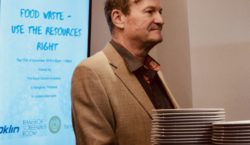
According to a new report recently released by Finnwatch, a Finnish civic organization focused on global corporate responsibility, logging related to harvesting cinnamon threatens Indonesian biodiversity.
Finnwatch examined the origin of cinnamon sold in the Finnish market from Finnish companies such as Meria and Paulig and how its sustainability is monitored. Most of Meira and Paulig’s cinnamon is from Indonesia; from the Kerinci region on the island of Sumatra, where around 80 percent of the world’s cinnamon comes from. The region has been negatively impacted by unsustainable cinnamon-harvesting practice, according to Finnwatch.
In a press release, Paulig confirmed the cinnamon used in their Santa Maria products has been predominantly harvested using logging. According to the company, the trees grow back, and the crop naturally regenerates. The company stated they have inspected their Indonesian cinnamon importers in 2017 and 2019.
Cinnamon is obtained from the inner bark of a cinnamon tree and the easiest way to collect the bark is by logging trees. According to Finnwatch, clearcutting entire plantations is not necessary as the method has been reported to cause a loss of biodiversity, erosion and deforestation in the region. Finnwatch has made recommendations looking at more sustainable harvesting methods as cinnamon can also be harvested by peeling the tree bark without logging entire trees.
According to Meira, their cinnamon is harvested using the peeling method. The company stated that they send company representatives to conduct audits on the harvest methods every two years. They also train cinnamon farmers on sustainable practices and harvesting during the audit visits but according to Finnwatch, Meira was not able to adequately verify its partners do not use logging in harvesting.
Currently, around 33 percent of spices purchased by Meira come from countries branded as ‘low-risk’, or from producers that have been certified as responsible by a third party.
Sonja Finér, Executive director at Finnwatch says buying responsibly-sourced cinnamon is a difficult task for the consumer, it requires an understanding of various certifications such as Fair Trade, Organic and Rainforest Alliance but note that these certifications still fail to show the full picture. A product labelled ‘organic’ is not a guarantee on fair working conditions for cinnamon producers, ‘Fair trade’ only looks at employee wages and work conditions which means ecological implications and other criteria might not be taken into account. Sonja Finér says, “We should be more ambitious with our legislation, which would also mean the burden on consumers could be significantly reduced.”
Source: YLE





